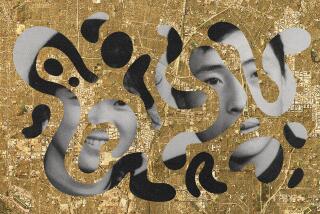Black Leaders Plan First-Ever Kwanzaa in County to Celebrate Unity, Heritage
- Share via
As residents frantically shop, bake and decorate for Christmas Day, leaders of Orange County’s black community are also busy preparing for the day after--the beginning of the county’s first celebration of Kwanzaa, a traditional weeklong festival of African-American culture and unity.
Spreading the word about Kwanzaa will be a difficult task, said Roland Holmes, program director of the Orange County Urban League. Most black residents are scattered throughout the county and unaware of plans for the celebration, which will be at the Corbin Center in Santa Ana. But whatever the turnout, the first Kwanzaa is bound to enhance the cultural pride of the black community, he said.
“My main concern is establishing the meaning of Kwanzaa and the seven principles,” Holmes said. “I think once folks get a chance to learn what Kwanzaa means for our everyday lives, they will (become) more involved.”
The seven-day ceremony, which begins the day after Christmas and ends New Year’s Day, means “first fruits” in Swahili, based on an African agricultural calendar, and observes nguzo saba (seven principles). Each day focuses on one of the principles.
‘Cultural Celebration’
“It is not a substitute for Christmas,” Holmes said. “Christmas is a religious celebration. Kwanzaa is a cultural celebration.”
Kwanzaa was brought to the United States in the mid-1960s by Maulana Karenga, the current chairperson of the black studies department at Cal State Long Beach. Karenga translated ancient African writings from Swahili, and from them created a contemporary celebration of African-American heritage.
To celebrate, families or community groups gather each evening of Kwanzaa, light one candle each night on the kinara, which is a candelabrum, similar to a Jewish menorah, and discuss the principle for that day. Afterward, they recite a series of chants in Swahili and celebrants drink from the karamu, a unity cup, Holmes said.
“There’s a basic ceremony, but over the years it has expanded and changed,” said Itihari Toure, an activist and community worker in Los Angeles. With “different families, different things may be added or deleted, depending on who celebrates it.”
The seven Kwanzaa principles are: umoja (unity), kujichagulia (self-determination), ujima (collective work and responsibility), ujamaa (cooperative economics), nia (purpose), kuumba (creativity) and imani (faith). They encourage one to enhance his community by improving his own life. For example, the sixth principle, kuumba, stresses the importance of being creative in order to leave the community “more beautiful, more beneficial than we inherited it,” Holmes said.
And ujima (faith), the third principle, encourages the community to “make our sisters’ and brothers’ problems our problem . . . to work to share them together,” he said.
“All the principles of Kwanzaa can be found in the dream espoused by Martin Luther King (Jr.),” said Holmes, referring to the slain civil rights leader’s famous speech. “It’s nothing new.’
Makungu Akinyela, a Los Angeles-based preacher and political organizer, said the 24-year-old tradition is practiced in communities nationwide, but is best known in Los Angeles, New York and Chicago.
In Los Angeles, a Kwanzaa parade, modeled after a traditional African procession, is held every year on the Saturday of Kwanzaa, Akinyela said. Celebrants leading the parade carry seven colorful six-foot foam cubes, each one symbolizing one of the principles.
As usual, participants in this year’s Los Angeles parade will don African garb of bright red, black and green--the colors of African liberation--and walk the route to the beat of African music, he said.
Black residents in Orange County do not celebrate Kwanzaa because the community is small and most have not yet learned about it, said the Rev. James Carrington of the Friendship Baptist Church in Yorba Linda.
Bringing Kwanzaa to Orange County could help black residents better understand their heritage, Holmes said. Black history has been lost over the years, and younger blacks have little sense of the role their forefathers played in shaping American society, he said.
More to Read
Sign up for Essential California
The most important California stories and recommendations in your inbox every morning.
You may occasionally receive promotional content from the Los Angeles Times.














